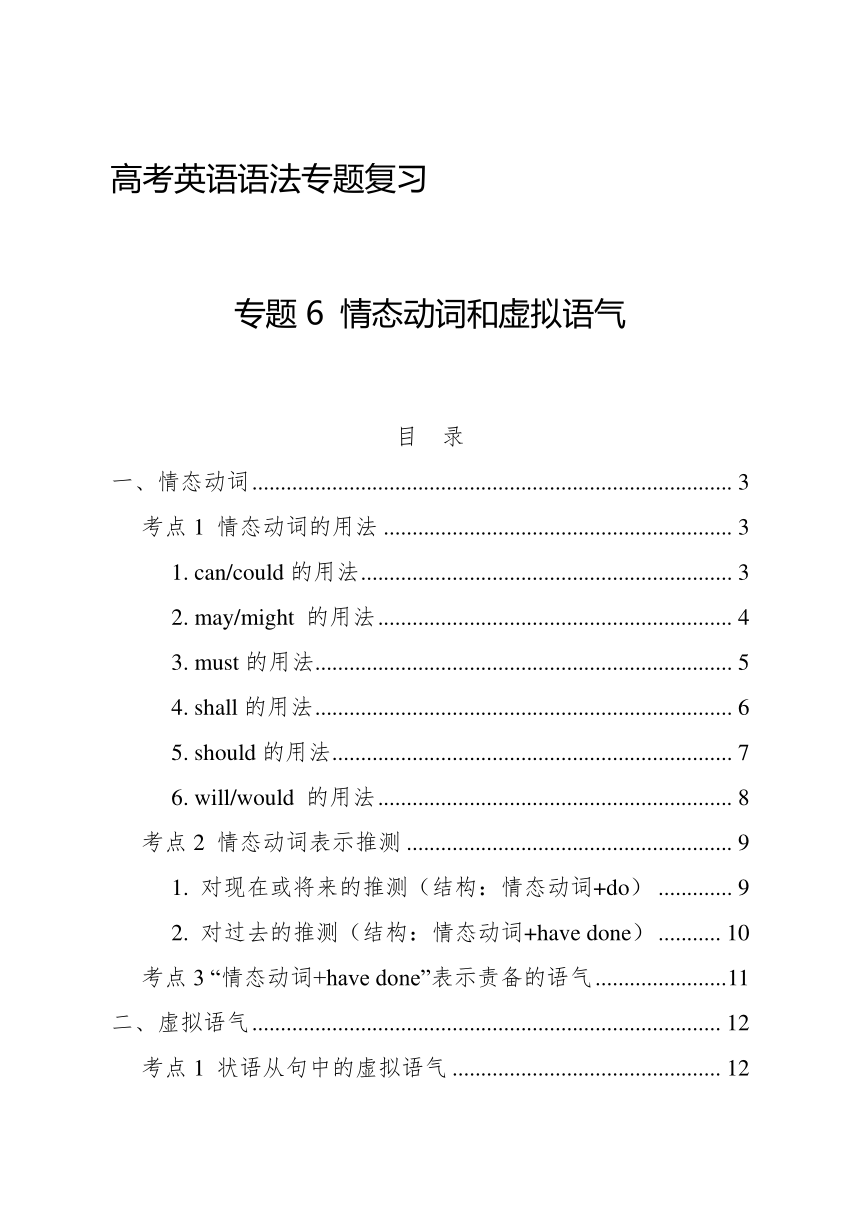
高考英语语法专题复习 专题6 情态动词和虚拟语气 目 录 一、情态动词 3 考点1 情态动词的用法 3 1. can/could的用法 3 2. may/might 的用法 4 3. must的用法 5 4. shall的用法 6 5. should的用法 7 6. will/would 的用法 8 考点2 情态动词表示推测 9 1. 对现在或将来的推测(结构:情态动词+do) 9 2. 对过去的推测(结构:情态动词+have done) 10 考点3 “情态动词+have done”表示责备的语气 11 二、虚拟语气 12 考点1 状语从句中的虚拟语气 12 1. 非真实条件句 12 2. as if / though引导的从句 16 考点2 名词性从句中的虚拟语气 17 1. 虚拟语气在宾语从句中的应用 17 2. 虚拟语气在主语从句中的应用 18 3. 虚拟语气在同位语从句中的应用 19 考点3 特殊的虚拟语气 20 1. if only的虚拟语气 20 2. It is(high)time that...句型中的虚拟语气 20 三、专项练习 21 四、答案解析 26 一、情态动词 情态动词主要包括can, may, must, shall, would, need等词及其过去式形式。 考点1 情态动词的用法 情态动词可以用来表示能力、许可、必要、义务、命令、劝告、询问、需要、应该、敢于等概念或态度。如:can(could),may(might), shall(should), will(would), must。 1. can/could的用法 (1)表示具备某种“能力”,但不一定做事情,仅仅表示有能力。 can表示现在;could表示过去。 I could do such things then, but I can’t now. 我那时候能做这样的事情,但现在不能了。 (2)表示“请求”(疑问句中)、“允许”,但could 比can 委婉;两者都指现在。回答一律用can或cannot,也可以用mustn’t。 —Can/could I smoke here 我可以在这里抽烟吗? —Yes, you can. 是的,你可以。 No, you cannot smoke here. 不,你不能在这里抽烟。 (3)特殊句式: 1)cannot/can never... too... 或cannot... enough “无论怎么……也不过分;越……越好;非常……”。 One cannot be too careful. 越仔细越好。 I cannot thank you enough. 我对你感激不尽。 2)cannot help doing.../cannot help but do... “禁不住;不由得;不得不”。 John could not help laughing when he saw the funny look of the monkey. 当约翰看到猴子滑稽的样子时,不由得笑了起来。 I could not help but think this is a very queer life. 我忍不住想这真是十分奇怪的生活。 2. may/might 的用法 (1)表示允许或请求允许,might的语气比may更礼貌。 May I turn on the TV 我可以打开电视吗? She asked if she might borrow my bike. 她问是否可以借用我的自行车。 (2)表示可能性,意为“也许”。这时may和might无时间上的差别,只是might在语气上更不肯定一些。 You may / might have some fever. 你也许发烧了。 He said that the news might be true. 他说这消息可能是真的。 表示可能性时,may / might不用于疑问句,可用can / could或别的说法。 Can/could they be having a bath 他们可能在洗澡吗? (3)构成句型:may / might(just)as well“不妨,最好”,与had better相近,意为“还是做某事的好;不妨去做某事”。 After sweeping the courtyard, we might as well clean the rooms.我们扫完院子后,顺手把房间也扫一扫。 3. must的用法 (1)表示义务、命令或劝告,意为“必须”。可用于任何人称。 We must take this seriously. 我们必须严肃对待这事。 在回答由must引起的问题时,如果是否定回答,多用needn’t或don’t have to,表示“不必,没必要”;而mustn’t表示“绝对不行,不可以”的意思,有时用来回答can或may开头的问句,表示语气很强的不允许。 —Must the ladies wear dresses 女士们必须着连衣裙吗? —No, they d ... ...
~~ 您好,已阅读到文档的结尾了 ~~